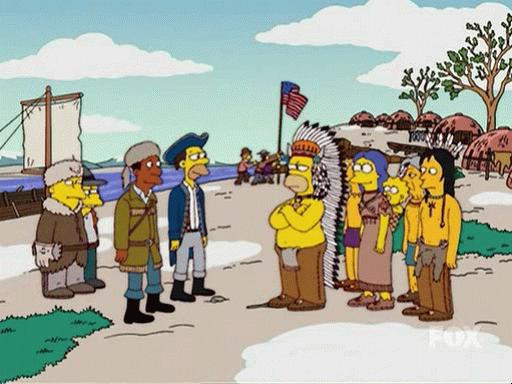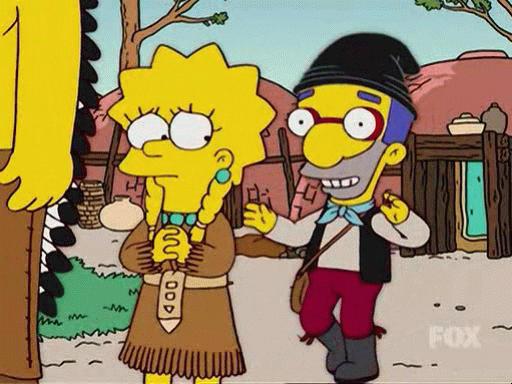 Another Stereotype of the Month entry:
Another Stereotype of the Month entry:
 Another Stereotype of the Month entry:
Another Stereotype of the Month entry:
The culprit in question:
The Simpsons: Margical History Tour
First Aired February 8, 2004
Production Code FABF06
Marge, the kids and Milhouse go to the library where they find there are no longer any books on the shelves. With no books for reference, the kid's reports are in danger of not being able to write their reports. Fortunately, Marge knows some history and relates to the children the following tales:
Henry VIII (Homer) tries to find a wife that will bear him a son.
Lewis and Clark (Lenny and Carl) get assistance from Sacagawea (Lisa) in their quest to explore the western territories.
Mozart (Bart) the musical child prodigy wows them in 18th century Austria, while his sister (Lisa) fights for her own musical identity.
Quotes from the episode:
Homer (as an Indian chief): Long have we awaited the arrival of the white man, and Carl.
Lenny & Carl: We'll never forget you, Pocahontas.
Lisa: Sacagawea!!!
Lenny & Carl: Gesundheit! (= bless you)

A review by the correspondent who brought it to my attention:
The episode of Simpsons premiered on Sunday, February 8, 2004. Lisa Simpson was playing the role of Sacagawea. Her father (Homer) was half nude in a headdress, and [played] a Chief who offered his daughter to them as a guide. The show claimed that her father sold her rather than being captured and sold by another tribe. Sacagawea's brother (Bart) was also was dressed as a stereotype with a tomahawk and complete with feathers and a fringed loincloth. Very little mention was made of her French husband, who was portrayed as a child as well. She had no infant with her nor was she portrayed as pregnant, and instead of the explorers wanting the French man who brought one of his wives, they went to Sacagawea's tribe who offered Sacagawea.
However it did bring up that the whites claimed to have civilized the Native people they forced into labor but were themselves unsophisticated and cruel. They were complete idiots while she was the only intelligent one among them. But, in the end they saved her life from a mountain lion [by] doing what she had taught them, and Marge, who was the narrator of the story, said that she was given a great honor by being placed on a dollar coin. She then...said you can trade it in the bank for a real dollar.
Marge had also said that the women got to learn about Sacagawea in school as a kid while the boys learned math, implying that it is a story not worth remembering or learning. [Implying] that the story of native figures do not belong as "real" sources of education.

Rob's comment
That the Chief (Homer) gave Sacagawea (Lisa) to Lewis and Clark isn't just a mistake, it's a stereotypical mistake. A chief giving away his daughter is one of the oldest clichés in Anglo-Indian mythology. It reinforces the notion that all tribes acted through a great leader...that other Indians were unimportant, anonymous "braves"...and that Indian women were immaterial unless they were "princesses" (i.e., daughters of the chief).
Related links
Indian women as sex objects
The big chief
Tonto and the "good Indian"
|
. . . |

|
All material © copyright its original owners, except where noted.
Original text and pictures © copyright 2007 by Robert Schmidt.
Copyrighted material is posted under the Fair Use provision of the Copyright Act,
which allows copying for nonprofit educational uses including criticism and commentary.
Comments sent to the publisher become the property of Blue Corn Comics
and may be used in other postings without permission.